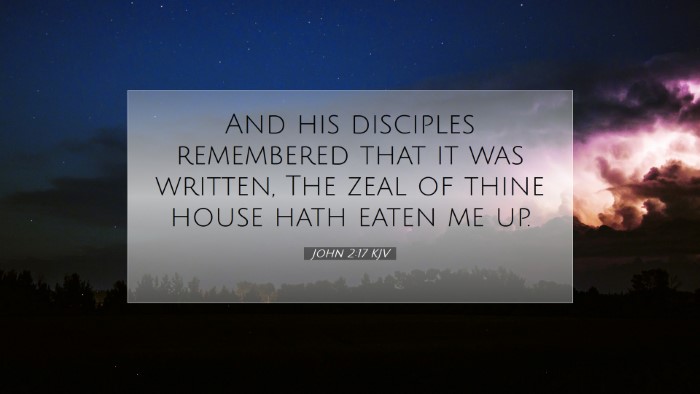Old Testament
Genesis Exodus Leviticus Numbers Deuteronomy Joshua Judges Ruth 1 Samuel 2 Samuel 1 Kings 2 Kings 1 Chronicles 2 Chronicles Ezra Nehemiah Esther Job Psalms Proverbs Ecclesiastes Song of Solomon Isaiah Jeremiah Lamentations Ezekiel Daniel Hosea Joel Amos Obadiah Jonah Micah Nahum Habakkuk Zephaniah Haggai Zechariah MalachiJohn 2:17
John 2:17 KJV
And his disciples remembered that it was written, The zeal of thine house hath eaten me up.
John 2:17 Bible Commentary
Commentary on John 2:17
Verse Reference: John 2:17 - "His disciples remembered that it was written, 'Zeal for your house will consume me.'"
Introduction
This verse serves as a profound reflection on the zeal of Jesus for God's house. The context places Jesus in the Temple at Jerusalem, where He drives out the merchants and money changers, indicating His righteous anger against the commercialization of sacred space. This commentary seeks to dissect the implications of this verse through the insights of renowned biblical scholars.
Insights from Matthew Henry
Matthew Henry notes that the phrase "zeal for your house" reflects a deep commitment to the sanctity of divine worship. He emphasizes that Jesus’ actions were not merely a display of anger, but rather an embodiment of divine zeal. In Henry's view, this zeal demonstrates the importance that God places on the purity of worship and the integrity of His house.
- Faithfulness to God's House: Henry stresses that Jesus' actions were a prophetic fulfillment underscoring the holiness demanded in God’s abode. Ancient worship was often characterized by reverence, which had been compromised by commercial interests.
- Symbol of Restoration: The cleansing of the Temple symbolizes a call to restore true worship and to remove anything that detracts from the grace and holiness God deserves.
- Personal Application: Believers are encouraged to examine their own worship practices, ensuring they reflect genuine devotion rather than mere ritual or commercialization.
Insights from Albert Barnes
Albert Barnes elaborates on the prophetic reference from Psalm 69:9, linking it directly to Jesus’ mission and identity. He interprets zeal as a consuming passion that even unto death consumed Jesus, reflecting His unwavering commitment to God’s righteousness.
- Fulfillment of Prophecy: Barnes highlights how the remembrance of Scripture by the disciples points to the fulfillment of prophecy, underlining the connection between the Old and New Testaments.
- Zeal Manifested: He also discusses how this zealous nature is integral to understanding Jesus as both the Messiah and the embodiment of God's purpose on earth.
- Community Reflection: For the early church, the zeal of Jesus became a model for their communal worship and gatherings, inspiring them to maintain the purity of their practices.
Insights from Adam Clarke
Adam Clarke provides a detailed theological examination of the term "zeal." He emphasizes that zeal can be a double-edged sword – it must be tempered with knowledge and understanding. Clarke's insights bring attention to the balance required in expressing zeal for God’s house.
- Potential for Misuse: Clarke warns against misdirected zeal, using the example of the Pharisees, whose fervor for the Law led to legalism rather than true worship.
- Inspired Action: He encourages readers to embody a zeal that is motivated by love and purpose rather than fear or obligation, aligning with the essence of Christ’s mission.
- Encouragement for Believers: Clarke urges pastors and laypeople alike to cultivate a heart for God's house that drives action towards stewardship, evangelism, and community engagement.
Theological Implications
The verse underscores significant theological themes that are essential for scholars and practitioners alike:
- God's Holiness: The necessity of maintaining the sanctity of God's dwelling place is essential in theology, reminding us that God's presence is to be revered.
- Jesus as Purifier: Jesus is our intercessor who purifies not only the Temple but also our hearts, encouraging believers to seek continual transformation.
- The Role of Zeal: Zeal must be pursued as a corporate body of Christ, reflecting a passionate commitment to worship that encourages integrity in all aspects of church life.
Conclusion
John 2:17 serves as a rich verse for reflection on themes of worship, zeal, and prophetic fulfillment. As pastoral leaders, students, and theologians delve into this passage, it is crucial to embrace the depth of Jesus’ character, recognizing that His zeal leads to both cleansing and restoration. The insights from the esteemed commentators remind us of our responsibility towards worship practices that honor God’s holiness and inspire a genuine relationship with Him.


